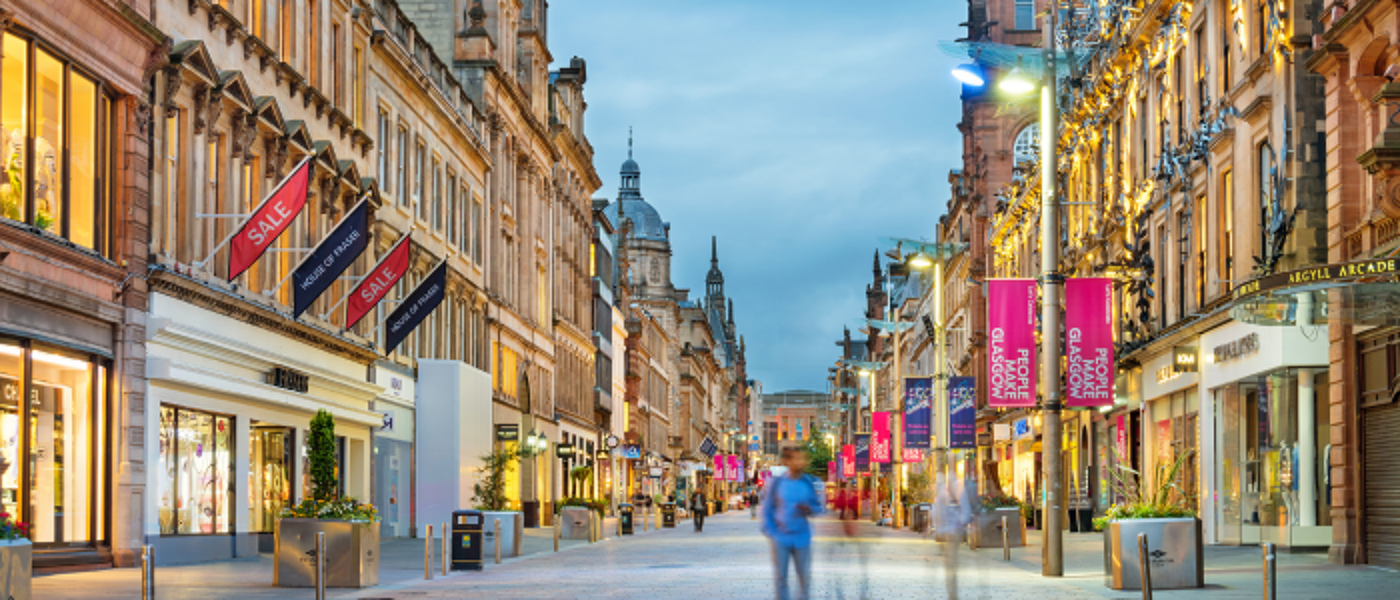Glasgow & University of Glasgow
At the Centre of Your MAGMa Journey
When you join MAGMa, the University of Glasgow will be a constant presence throughout your degree. As the coordinating institution, the University will provide the structure and continuity that will support your learning across every stage of the programme. From the moment you enrol to the day you graduate, Glasgow will serve as your anchor—no matter where in Europe your mobility takes you—and you will remain a fully registered postgraduate student at the University for the duration of your degree.
Throughout your first three semesters, you will engage with three core courses taught online by University of Glasgow History of Art academics: Interdisciplinary Research Methods and Approaches, Cultures of Collecting, and Provenance and Restitution. These modules will equip you with the methodological and critical tools needed to navigate the ethical, political, and practical dimensions of working with collections in global contexts.
In addition, you will have the opportunity to participate in one of two Summer Schools held in Glasgow in July. Whether you choose to explore colonial collecting practices at The Hunterian or focus on cultural protection through the Smithsonian Cultural Rescue Initiative, these sessions will allow you to apply your knowledge in focussed, hands-on settings.
You may also choose to return to Glasgow during your final semester to complete your dissertation within a vibrant research environment, before rejoining your cohort to graduate at the University in the winter of your second year.

About Glasgow
- In 2019, Glasgow was named the UK’s top cultural and creative city, outperforming London, Manchester, and Edinburgh (European Commission, 2019).
- Glasgow was voted the friendliest city in the UK in 2024 by readers of Condé Nast Traveller (Condé Nast Traveller, 2024).
- Glasgow was named the 4th best student city in the UK in the QS Best Student Cities ranking for 2025, praised for its affordability and student life (QS Top Universities, 2025).
- Home to over 185,000 students across three major universities, Glasgow is one of the UK’s most vibrant student hubs (Prospects, 2024).
- Glasgow was recognised as the UK’s first UNESCO City of Music, and now hosts more than 130 music events every week (UNESCO, 2024).
- Glasgow’s cultural attractions, including free public museums and festivals, make it the second most visited city for culture in the UK after London (Glasgow Life, 2023).

About the University of Glasgow
Founded in 1451, the University of Glasgow is one of the oldest and most prestigious universities in the English-speaking world. A World Top 100 university (QS World University Rankings, 2025), it is also a member of the UK’s Russell Group—a network of leading research-intensive universities recognised for academic excellence and global impact. As the coordinating institution for MAGMa, Glasgow provides the academic and structural foundation of the programme, supporting your journey from enrolment to graduation.
- Online Learning & Core Teaching: During your first three semesters, you will complete three core courses taught online by University of Glasgow staff. These modules are designed to equip you with the analytical and methodological foundations essential to your MAGMa journey.
-
University Library & Digital Resources: As a fully registered student, you will have full access to the University Library’s extensive digital collections, including academic journals, databases, eBooks, and archival materials. Course readings will be available online through the library’s integrated platform.
-
Moodle & MyCampus: You will use Moodle as your primary platform for accessing course materials, announcements, and assignments. MyCampus is the University’s central academic management system, where you can view your registration details, assessment outcomes, and official documents.
- College of Arts & Humanities: Glasgow is a World Top 60 university for Arts & Humanities (THE World University Rankings, 2025), and combines centuries of academic tradition with a global, future-facing outlook. As a MAGMa student, you will be part of the University’s College of Arts & Humanities (CoAH), benefiting from its world-leading teaching, research, and vibrant academic community.

Visa Requirements
- Students who are citizens of the UK or Ireland do not require a visa to live and study in Scotland.
- Students who are citizens of EU countries and already hold settled or pre-settled status under the EU Settlement Scheme do not require a visa to live and study in Scotland.
- Students who are citizens of EU countries but do not have settlement status do not require a visa to study in Scotland for up to six months. However, depending on your nationality, you may need to apply for an Electronic Travel Authorisation (ETA) before entering the UK.
- Students from outside the European Union (EU) and European Economic Area (EEA) must obtain a Standard Visitor visa if they plan to stay in Scotland for Semester 4 and do not already hold UK immigration permission.

Cost of Living
If you choose to live in Glasgow in Semester 4, it’s essential to consider the various costs you may encounter during your studies. These include:
- Living expenses: This includes accommodation, food, travel, books, clothing, and entertainment. Your daily expenses will depend on factors like where you live and your lifestyle choices.
- Bills: Regular utility costs such as electricity, gas, WiFi, mobile phone bills, and streaming services should be factored in as part of your monthly budget.
- Emergencies: Unexpected expenses can arise, such as medical costs or unforeseen travel. It’s important to have a financial buffer for these situations.
Glasgow offers a more cost-effective living option compared to other major UK cities. The Univesity of Glasgow provides a detailed overview of monthly cost breakdown for students below.

Accommodation
If you attend one of the optional Summer Schools at the University of Glasgow, your accommodation will be arranged for you at no extra cost. MAGMa students are typically housed together in university-managed student halls near campus, allowing you to live and learn alongside your peers for two weeks.
If you choose to base yourself in Glasgow for your final semester while completing your dissertation, you will need to secure accommodation independently, whether through the private rental market, University of Glasgow student housing, or private student housing.
Many students live in the West End, close to the University, or in surrounding neighbourhoods with good transport links. You can explore private rental options on the following platforms:
Alternatively, you may wish to consider student housing through providers such as:

Public Transport
Glasgow has a reliable, affordable public transport system that makes it easy to navigate the city and surrounding areas.
- Subway: The Glasgow Subway (SPT), also known as “the Clockwork Orange”, is a simple circular underground system connecting the city centre, West End, and South Side. The University of Glasgow is closest to Hillhead Station on the Inner Circle and can be reached in under 10 minutes from the city centre, where Buchanan Street or St Enoch station are located within minutes of each other. You can order a free Subway Smartcard online, which can be topped up with credit at any station and used for travel at lower rates than buying paper tickets.
- Buses and Trains: Glasgow is well connected by a wide-ranging public transport network, making it easy to travel both within the city and across Scotland and the UK.
- Locally, frequent bus services—primarily operated by First Bus—serve the entire city, including the West End and the University area. ScotRail trains connect Glasgow with surrounding towns and suburbs, offering a quick and convenient way to explore the wider region.
- Nationally, Glasgow is a major transport hub. The city has two main railway stations: Glasgow Central, which offers direct services to destinations in the south (including London, Manchester, and Birmingham), and Glasgow Queen Street, which connects you to cities across Scotland such as Edinburgh, Stirling, Dundee, Aberdeen, and Inverness.
- Taxis: Uber operates in Glasgow and is often a cheaper alternative to local taxi services such as Glasgow Taxis, Hampden Cars, and Network Private Hire—all of which are reliable and widely used across the city.

Student Support
The University of Glasgow is committed to supporting your success and well-being, providing a wide range of services to help you thrive throughout your studies. Whether you’re based on campus or at a partner university, you’ll have access to:
- Wellbeing & Mental Health: The Counselling & Wellbeing Service offers confidential mental health support, wellbeing masterclasses, and guided self-help tools, with the option to register for 1:1 appointments or emergency assistance via support lines. A Peer Wellbeing Support service, staffed by trained students, is also available.
- Careers, Employability & Opportunity: Glasgow Careers offers professional career coaching, peer career support, CV reviews, internship placement services, employer events, and support tailored to international students—all accessible online and in person.
- Disability Support Service: The Disability Service provides support for physical, sensory, mental health, or neurodiverse needs—offering needs assessments, assistive technologies, exam accommodations, and liaison with teaching staff.
- International Student Support: The dedicated International Student Support team assists with visas, orientation, finance, working in the UK, and settling into university life. They offer online and in-person advising and events to guide your journey.
- Campus Safety: The SafeZone app, operated by Campus Security, provides 24/7 emergency support and campus monitoring.

Healthcare & Emergencies
- Health risks in Scotland are minimal, with the UK maintaining high standards of public health and hygiene. Tap water is safe to drink and of an extremely high standard, and food establishments follow strict safety regulations.
- All MAGMa students visiting the UK should ensure they have valid health insurance for the duration of their stay. EU students are advised to carry a European Health Insurance Card (EHIC) or Global Health Insurance Card (GHIC), where applicable.
- Students staying in Glasgow for Semester 4 are eligible to access NHS services, the UK’s public healthcare system. If you stay for more than three months, you are strongly encouraged to register with a local GP (doctor) upon arrival.
- Private healthcare options are also available in Glasgow, including walk-in clinics and private medical practices for those seeking additional coverage or faster appointments.
- The closest hospitals to the University are the Queen Elizabeth University Hospital and the Glasgow Royal Infirmary, both accessible via public transport and car.
- For medical emergencies, as well as fire and police services, call 999 (emergency) or 111 (non-emergency NHS medical advice).

